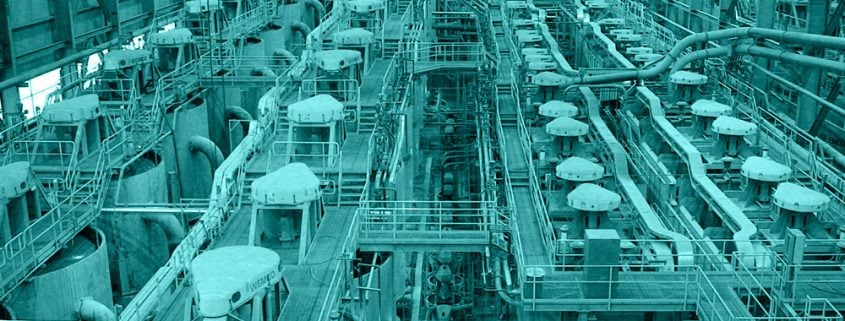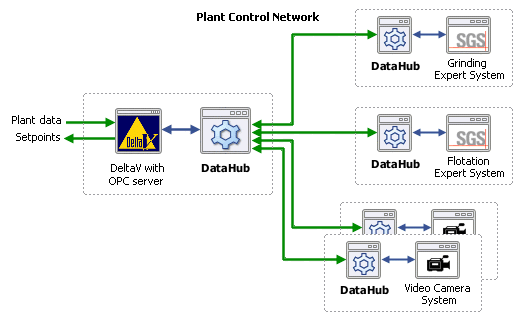Case Study: Minera San Cristobal, Bolivia – 2
Using DataHub software to integrate video cameras and expert systems
Minera San Cristobal, owned by Apex Silver and Sumitomo Corporation, is one of the largest silver-zinc-lead mining projects in the world. The mine, located in the Potosi district of southwestern Bolivia is expected to produce approximately 450 million ounces of silver, 8 billion pounds of zinc, and 3 billion pounds of lead.
As described in a companion article, the engineers at the San Cristobal mill used DataHub® software to connect their DeltaV Professional Plus SCADA system to an SQL Server database in the corporate offices. After witnessing the success of that project, the engineers decided to connect their two SGS expert systems to DeltaV in a similar way.
“We saw how well DataHub software transported OPC data across the network,” said Sr. Mario Mendizabal, Production Engineer at Minera San Cristobal, “so we thought it could help us connect to our Grinding and Flotation Expert Systems.”
In the San Cristobal mill the ore extracted from the mine is crushed, ground, and refined through flotation process to yield concentrates of silver, zinc, and lead, which are then shipped abroad for final smelting. These processes are monitored and controlled using the DeltaV system.
Although the DeltaV system allows an operator to input setpoints and other values directly into the system, Sr. Mendizabal and his team wanted to apply an SGS Advanced Systems application to optimize two critical parts of the mineral refining process: grinding and flotation. Each expert system runs on a separate sever. To add to the challenge, the Flotation Expert System also requires real-time data input from two banks of 25 video cameras. These cameras monitor the size, speed, and other qualities of the bubbles as they lift the valuable mineral particles to the surface, where they can be skimmed off as foam. There is one bank of cameras for the zinc flotation circuit, and another for lead. Each of these five systems-DeltaV, the Grinding Expert System, the Flotation Expert System, and the two camera systems-needed to be connected in real time.
Fortunately, each system had an OPC server. What was needed was a way to bridge the OPC servers, aggregate their data streams, and tunnel/mirror the data across the network for the other systems. Based on his previous success using DataHub software, Sr. Mendizabal chose to apply it to this task. He already had a DataHub instance connected to the DeltaV system. So he just installed a DataHub instance on each of the SGS servers, and each of the camera system servers. Then he connected those four DataHub instances to the main DataHub instance running on the DeltaV server.
“It didn’t take long at all to get the system configured,” said Sr. Mendizabal. “Since it is tunnel/mirroring across the network, we avoided DCOM settings and networking issues entirely. The connection is completely secure, and rock-solid.”
When the expert systems are switched on, the plant data flows from DeltaV to the Grinding Expert System and the Flotation Expert System. These systems continuously and intelligently adjust the values of the setpoints, and send them back in real-time to DeltaV, which passes them along to the relevant process. To make its calculations, the Flotation Expert System also takes into account the real-time data that is streaming in from the two Video Camera Systems.
“It is very important to know that when the expert system is controlling the plant we are trusting our production to DataHub software,” said Sr. Mendizabal. “We are very pleased with its performance, and highly recommend it for this kind of mission-critical work.”






